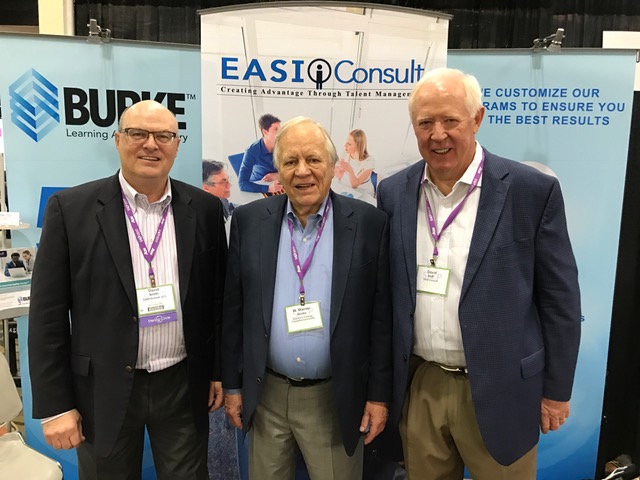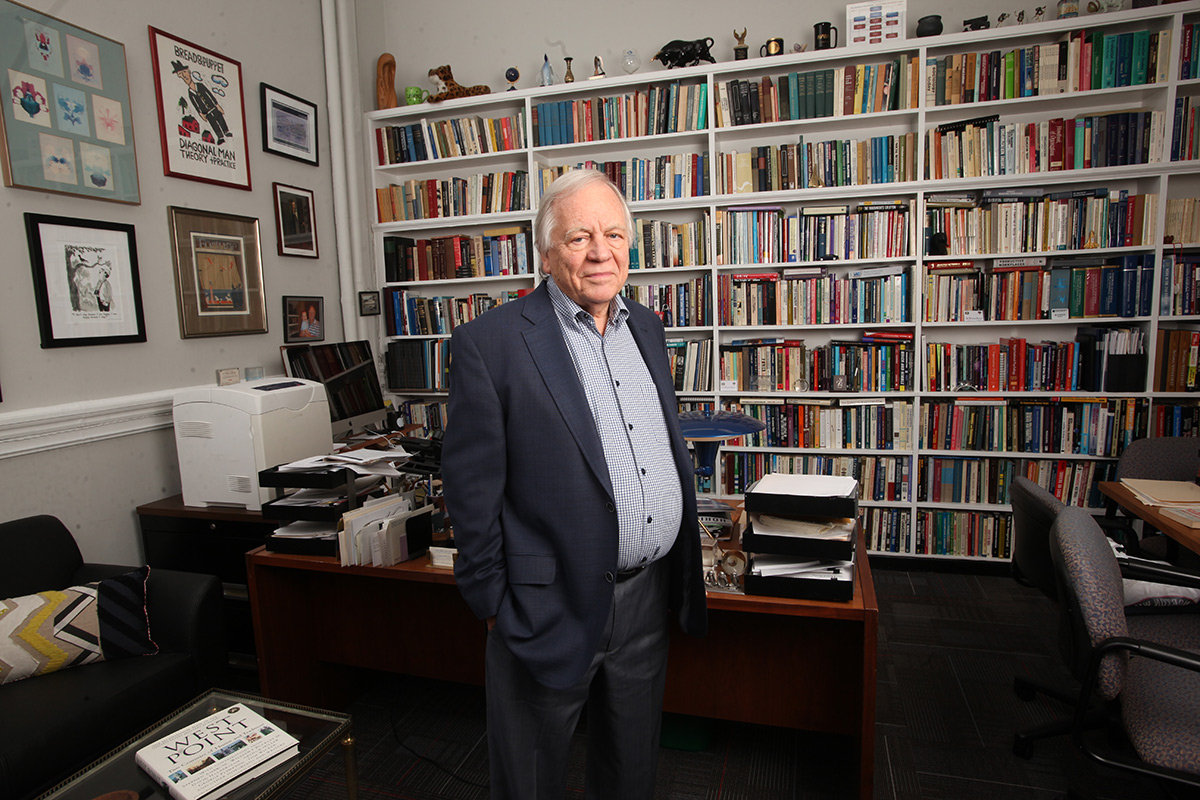TC faculty members have lots of great ideas.
Many also generously support student scholarship.
W. Warner Burke, the College’s E.L. Thorndike Professor of Psychology & Education, is combining those two endeavors. Through a licensing agreement with a St. Louis-based firm called EASI-Consult, Burke has ensured that half the profits from an assessment tool he’s created called the Burke Learning Agility Inventory will support scholarships for doctoral students in TC’s Social-Organizational Psychology program.

WIN WIN PARTNERSHIP Burke (center) with Hoff (right) and David Smith, EASI-Consult's President and CEO.
“We get some of the best students from around the world, including many who have been key partners in my own research,” Burke says. “They deserve the chance to focus on their studies and their research.”
Curiouser and Curiouser
For much of the past decade, Burke, a consultant to Fortune 500 companies who is internationally known for his theories of organizational change, has explored learning agility – the ability to learn what’s needed in order to adapt to new situations.
“I recently finished Walter Isaacson’s book on Da Vinci, who was probably the most agile learner on the planet,” he says. “He was curious about everything – why water has bubbles, why the sky is blue.”
We get some of the best students from around the world, including many who have been key partners in my own research,” Burke says. “They deserve the chance to focus on their studies and their research.
— W. Warner Burke
Burke’s working hypothesis is that learning agility is the X factor that defines and predicts great leadership. He and his students have created the Burke Learning Agility Inventory, a 38-question test that gauges leadership potential. The Inventory measures nine components of learning agility: flexibility, speed, experimenting, performance risk-taking, interpersonal risk-taking, collaborating, information gathering, feedback seeking and reflecting.
Several years ago, after Burke spoke at the annual meeting of the Society for Industrial and Organizational Psychology, he was approached by EASI-Consult’s chief operating officer, TC alumnus David Hoff (M.A. ’73, M.Ed.’73), whom he has known for many years. “At that time, there was a learning agility model in the literature that people with research training were questioning,” Hoff recalls. “Warner said, ‘I can do it better,’ and I said, ‘If you do, we’d like to represent it.’”
A partnership ensued, with EASI-Consult transforming the Inventory into a commercially available test that can be administered by trained industrial psychologists. The firm is still earning back its research investment, but TC students could see the benefits within the next year: Hoff reports that a number of private-sector clients are using the Inventory, including Genworth Financial, Peabody Energy, Gorton’s Seafood, Air Liquide, Intelsat, and OSF Health Care. To help human resources managers and others better understand the Inventory, Hoff and Burke also have coauthored the book Learning Agility: The Key to Leader Potential (2017 Hogan Press), with a chapter devoted to each of the nine Learning Agility component skills.
Right Back At You, Professor Burke
Warner Burke’s colleagues and former students have banded together to create The W. Warner Burke Endowed Scholarship Fund to support students in the Social-Organizational Psychology program. The Fund honors Burke for his outstanding contributions to the field– particularly his explorations of how change functions across organizations, which helped set the direction for generations of subsequent scholars, executives and consultants.
You can direct a gift to the Fund using a major credit card -- or, if you have questions, or have difficulty using this form, you can email Susan Scherman or call 212-678-8176.
Taking Inventory
The Inventory’s most immediate application is for hiring new talent.
“When organizations hire for a key position, and they’ve narrowed the field of candidates down to two or three finalists, a trained industrial organizational psychologist will administer the Burke Learning Agility Inventory along with other assessments like the Watson-Glazer Cognitive Abilities Test or the Jackson or Hogan Personality Tests,” says Hoff. “And my dream is that the Inventory will become a staple in that regard.”
But with industries in flux and the demand for different skills constantly changing, leadership development may be an even more promising application.
“Look at the banking industry,” Hoff says. “Right now, banks boast about having lots of branches – but with online banking, going to branches is already a thing of the past. Or take the car insurance industry – with self-driving cars coming online in the next few years, what are they going to insure? These sectors will need to retrain a lot of employees and hire others, and I believe it’s not going to be on the basis of skills people have right now, but instead, on their ability to learn what’s coming three to five years down the road.”
Getting Results
Does the Inventory actually work? A recently completed study of employees at a Fortune 500 company found that those who scored well on the Inventory were more open to new experiences; had more tolerance for ambiguity; were more ego-resilient; and better able to learn from their mistakes.
“As Samuel Beckett put it, you try again, fail again and fail better,” Burke says. “People who are learning agile have an internal ‘locus of control,’ which is an idea that the social psychologist Julian Rotter measured during the 1950s and 60s. Basically, he divided people into two types – externals and internals. If I’m an external, my locus of control is outside me. I’m a victim of circumstance. If I’m an internal, I believe I’m the master of my fate. And learning agility correlates positively with internal.”
Look at the banking industry or the car insurance industry. These sectors will need to retrain a lot of employees and hire others, and I believe it’s not going to be on the basis of skills people have right now, but instead, on their ability to learn what’s coming three to five years down the road.
— David Hoff
Even better, the Inventory appears to predict performance. In a dissertation study of hedge fund managers, Bradford Smith (Ph.D. ’15), now a research science manager at Amazon, found that those who scored high on the Burke Inventory earned higher profits. Another dissertation, by current doctoral student Lauren Catenacci-Francois, has found that managers at an engineering firm who scored high on the Inventory were more successful in meeting their boss’s performance expectations. And EASI-Consult is channeling 10 percent of its revenues from the instrument into further research on additional uses – for example, whether it’s possible to measuring the learning agility of an entire group or organization.
Burke says he’s delighted with these results. “We’re getting the correlations you’d want – with inspirational leadership, with having a vision and being emotional and passionate about what you’re doing, and with innovation. There’s only one that bugs me. And that’s age. There’s a suggestion that older people are more set in their ways.” He smiles ruefully. “But that, too, is what you’d expect.” – Joe Levine
